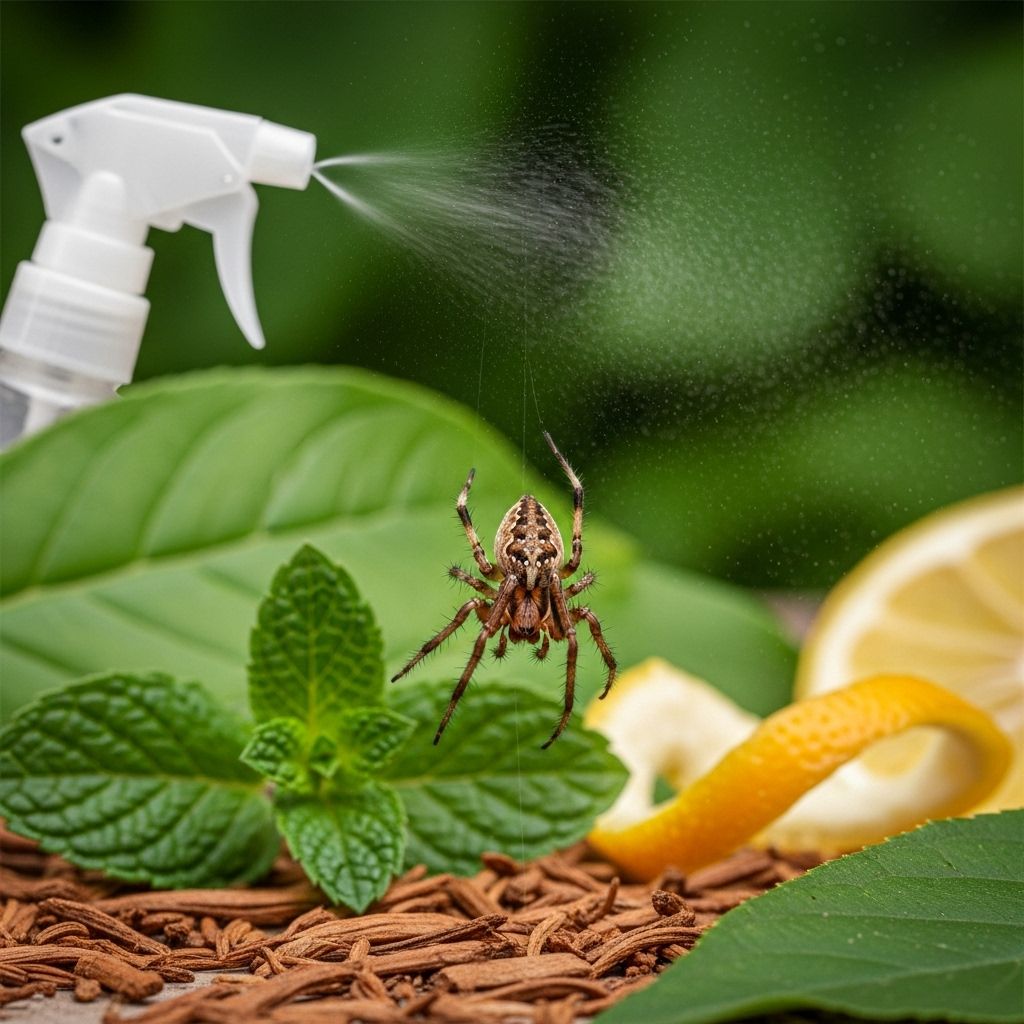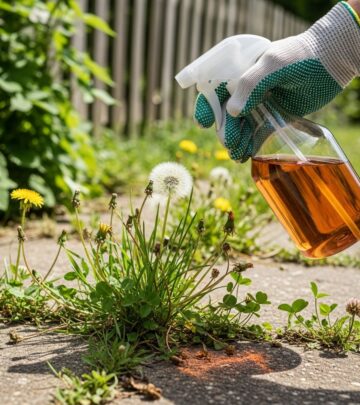Natural Spider Repellents: Safe, Effective Ways to Keep Spiders Out
Deterring eight-legged intruders with everyday oils and easy DIY sprays.

Spiders play a vital role in controlling pests, but nobody likes surprise encounters with them inside our homes. For those seeking chemical-free solutions, various natural spider repellents can help keep these unwanted guests outside where they belong. This comprehensive guide explores proven ingredients, expert advice, recipes, and preventative tips for maintaining a spider-free home without harsh chemicals.
Why Choose Natural Spider Repellents?
Many store-bought spider killers contain strong pesticides that pose risks to children, pets, and air quality. Natural repellents offer safe alternatives, utilizing scents and ingredients spiders notably dislike. These homemade methods support healthier indoor environments and are easy to apply using everyday household items.
Scents and Ingredients That Repel Spiders
Spiders rely heavily on their senses for survival. They detect smells with their leg hairs and feet, which makes strong scents an effective deterrent. Here are the aromas and substances spiders hate most:
- Peppermint Oil – Highly effective and the most widely recommended. Its pungent smell repels spiders and keeps your home smelling fresh.
- Vinegar (White Vinegar) – The sharp scent and acidity overwhelm spiders’ senses and serve as a quick, accessible repellent.
- Citrus Oils (Lemon, Orange) – Natural, vibrant fragrances that spiders avoid.
- Lavender – Offers dual benefits as a calming scent for humans and a powerful deterrent for spiders.
- Eucalyptus Oil – Its strong aroma is disliked by most insects, including spiders.
- Tea Tree Oil – Known for its broad pest-repelling properties.
Other less common, experimental repellents include wasabi and bitter melon, which are thought to irritate spiders’ sensory organs.
Top Methods and Recipes for Natural Spider Repellents
1. Peppermint Oil Spray
Peppermint oil is a favorite among pest control experts and DIYers. Its use is simple and effective:
- Combine 10-15 drops of pure peppermint oil with 1 cup of water in a spray bottle.
- Add a teaspoon of mild liquid soap or dish detergent to help disperse the oil.
- Shake thoroughly and spray along baseboards, window frames, doorways, and anywhere spiders are spotted.
For added long-term result, consider placing peppermint plants around the kitchen and entryways.
2. Vinegar Spider Deterrent
- Mix white vinegar and water in a 1:1 ratio (e.g., 1 cup vinegar, 1 cup water).
- Add a teaspoon of liquid soap to disperse.
- Apply with a spray bottle around windows, doors, and baseboards.
Warning: Test vinegar solutions first on sensitive surfaces to avoid damage.
3. Citrus Oil Spray
- Combine several drops of lemon or orange oil with 1 cup water.
- Shake well and spray throughout high-risk areas, including under furniture and dark corners.
Alternatively, rub lemon peels along windowsills and around air vents for a continuous repelling effect.
4. Lavender as a Repellent
Lavender can be implemented in multiple ways:
- Grow lavender plants near entryways and in gardens.
- Use lavender-scented sachets in closets, bedrooms, and pantry shelves.
- Mix a few drops of lavender oil with water and apply as a spray.
This method offers a pleasant scent for humans while discouraging spider presence.
5. Eucalyptus and Tea Tree Oils
- Blend these oils individually or together with water (10 drops per cup) and spray around your home.
- Use essential oil diffusers in the living room or bathrooms to help maintain a spider-free space.
DIY All-Natural Spider Repellent Recipe
For a broader spectrum repellent, this simple, multipurpose spray blends several effective ingredients:
- 1 cup vinegar
- 1 cup pepper
- 1 teaspoon oil (e.g., vegetable, olive, or coconut)
- 1 teaspoon liquid soap
Mix all ingredients and pour into a spray bottle. Shake before each use, and spray around windows, doors, foundation edges, and any visible entry points.
Additional Natural Deterrents and Tips
- Turn Off Outdoor Lights – Nighttime lights attract insects, which in turn draw spiders. Consider using yellow bug light bulbs for less attraction.
- Declutter Indoors and Outdoors – Remove piles of leaves, wood, and debris from around your home’s foundation and keep garage and storage rooms tidy.
- Regular Cleaning – Vacuum floors, under furniture, and in corners where spider webs often form. Clean surfaces regularly to remove eggs and webs.
- Seal Entry Points – Use caulk to seal cracks and gaps around doors, windows, and utility lines. Door sweeps and window screens provide barriers that discourage spider entry.
- Sticky Traps – Place simple glue or sticky traps in secluded spaces. While not ‘natural’, they are non-toxic and effective alongside repellents.
- Use Natural Plant Barriers, such as placing sprigs of peppermint or lavender inside kitchen cupboards and drawers.
How Aromatic Plants Help Deter Spiders
Certain indoor and outdoor plants naturally repel spiders thanks to strong-smelling oils they emit. Consider these options for integrated pest control:
- Peppermint
- Lavender
- Eucalyptus
- Lemon Balm
- Basil
Grow the plants in pots near windows, doors, or anywhere you’ve noticed spider activity for added protection and improved air quality indoors.
How Do Natural Repellents Work?
Most natural repellents function by overstimulating or blocking spiders’ ability to sense their environment. Because spiders taste and smell using the tiny hairs on their legs and feet, essential oils and other strong scents overload these sensory organs. This irritation encourages them to exit or avoid treated areas altogether.
Frequent reapplication is often necessary to maintain effectiveness, especially in high-traffic, high-humidity, or frequently cleaned areas.
Common Mistakes to Avoid with Natural Spider Repellents
- Not Testing First – Always conduct a spot test when using vinegar or oils on painted, lacquered, or absorbent surfaces to prevent damage.
- Using Too Little Oil – Low concentration may be ineffective; follow recipe instructions for optimal results.
- Forgetting Preventative Cleaning – Repellents only work well when combined with regular cleaning and removal of webs.
- Neglecting Entry Points – Skip sealing gaps and windows, and spiders will still find ways in.
- Expecting Quick, Permanent Results – Natural repellents need consistent application and work best as part of an overall pest management routine.
Integrated Spider Management: Combining Natural Solutions
Experts recommend a combined approach for best results:
- Begin with a thorough cleaning—vacuum webs and egg sacs, clear clutter.
- Identify and seal cracks or gaps, focusing on basements, attics, and crawl spaces.
- Apply one or more natural spray recipes, using scents that suit your tastes and needs.
- Supplement with sticky traps for monitoring spider activity in awkward spaces.
- Plant aromatic herbs outdoors and near entrances to add ongoing natural protection.
This approach reduces spider populations gradually and prevents new ones from settling indoors.
Frequently Asked Questions (FAQs)
What smell do spiders hate the most?
Peppermint oil and vinegar top the list for most effective spider-repelling scents, with citrus, lavender, and eucalyptus following closely.
Are natural spider repellents safe for pets and children?
Most natural repellents are considered safe when diluted and used appropriately; however, essential oils should be kept out of reach for pets and children to avoid direct contact.
How often should I reapply natural spider sprays?
Depending on humidity and cleaning habits, sprays typically need refreshing every 1-2 weeks, or after major cleaning sessions.
Can these repellents help with other insects?
Yes, most essential oils and vinegar sprays deter a variety of pests, including ants, flies, and even mosquitoes.
Do natural repellents eliminate spiders, or just keep them away?
These methods mainly deter spiders by making treated areas unattractive; occasionally, strong sprays (such as vinegar or wasabi) can kill spiders directly, but prevention is the main goal.
Comparison Table: Natural Spider Repellent Ingredients
| Repellent | Method of Use | Strengths | Cautions |
|---|---|---|---|
| Peppermint Oil | Spray, Diffuser, Plants | Highly effective; pleasant aroma | Essential oil may irritate pets if undiluted |
| White Vinegar | Spray, Wipe Down Surfaces | Readily accessible, kills on contact | May damage sensitive surfaces |
| Citrus Oil | Spray, Fruit Peels, Sachets | Fresh scent, deters multiple pests | Some citrus oils can cause skin irritation |
| Lavender | Plants, Oils, Sachets | Calming for humans, strong for spiders | Requires regular replacement of sachets |
| Eucalyptus Oil | Spray, Diffuser | Long-lasting scent, broad pest repellent | Strong odor; avoid direct contact with pets |
Expert Advice on Natural Spider Repellents
George Schulz, a registered pest management technician, recommends natural repellents as part of an overall plan: “Peppermint, vinegar, and citrus oils effectively deter minor spider problems, but it’s crucial to combine them with exclusion and cleaning. For dangerous species or large infestations, professional pest control is usually required.”
Remember: natural methods require patience and regular upkeep for best results. If spider activity persists, reassess your entry points, cleaning habits, and reapplication technique to boost effectiveness.
Conclusion: Embracing Safer Spider Prevention
Safely and effectively keeping spiders out of your home starts with practical chemical-free solutions. Essential oils, cleaning routines, and DIY sprays provide peace of mind and a healthy living environment. Regular application, closure of entry points, and tidy surroundings make your home less welcoming for spiders year-round.
Embrace these natural strategies for a cleaner, fresher, spider-free space—without compromising the safety and comfort of your loved ones.
References
- https://www.bhg.com.au/lifestyle/natural-spider-spray/
- https://www.youtube.com/watch?v=N0r8dQxVwqE
- https://www.housebeautiful.com/uk/lifestyle/a37702624/spider-proof-home/
- https://bettertermite.com/how-to-get-rid-of-spiders-in-house/
- https://www.sciencebuddies.org/science-fair-projects/ask-an-expert/viewtopic.php?t=6585
Read full bio of medha deb










